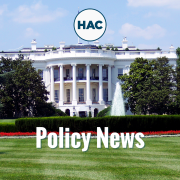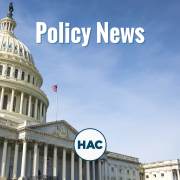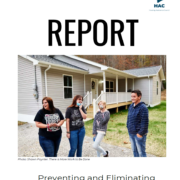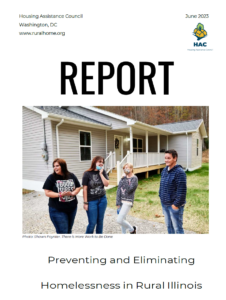The budget reconciliation bill, formerly known as the One Big Beautiful Bill Act, became law on July 4 with President Trump’s signature after a lengthy voting process in Congress. HAC’s review below focuses primarily on the bill’s positives for affordable housing and community development and offers some recommendations for improving them further in future legislation.
Major Non-Housing Provisions Will Impact Affordable Housing
Estimates indicate the law will have significant impacts on federal taxes, deficits, and spending. The nonpartisan Congressional Budget Office calculated that it will add $3.4 trillion to the federal debt over the next ten years. Analyses by the Penn Wharton Business Model, CNN, the Tax Policy Center, the Economic Policy Institute, and others show that the law will provide significant tax cuts for the highest income Americans, fewer benefits for middle-income households, and some negative impacts for those with the lowest incomes. Revisions to Medicaid and the Affordable Care Act mean millions will lose health insurance. Changes to the Supplemental Nutrition Assistance Program (SNAP) will remove food support for millions.
The law increases funding for immigration enforcement. It reduces funding for the Consumer Financial Protection Bureau (CFPB) but does not go as far as an earlier version of the bill passed by the House, which would have eliminated the CFPB entirely. It does not require that public lands be sold to create space for development of new housing, another provision that was in the House bill.
The law also repeals the Greenhouse Gas Reduction Fund and rescinds unobligated funds remaining for the program. It cancels funding for a number of other energy-related programs created in the 2022 Inflation Reduction Act, including HUD’s Green and Resilient Retrofit Program, and cancels a number of energy-efficiency tax credits. Last-minute changes temporarily reduced, but did not eliminate, some of the law’s negative impacts on wind and solar projects. Taken as a whole, these provisions are likely to increase energy costs, with a disproportionately high impact on the lowest-income families because they pay the largest proportion of their incomes for energy.
Some of the law’s negative impacts will be especially significant for rural Americans. For example, while it increases funding for the Rural Health Transformation Program from $25 billion to $50 billion, that will not replace the $87 billion cut from rural hospital funding under the law’s other provisions. Rural communities already face unique health challenges including limited access to care, and closing hospitals can only add to their difficulties.
While HUD and USDA housing assistance programs are not directly affected by the law, the people they serve will feel its effects. States were authorized to use Medicaid for health-related needs, including housing (although the current administration may be rethinking that flexibility). When the proportion of income needed for food and medical care rises, the amount remaining for housing is reduced. People who need Medicaid and SNAP assistance may also qualify for housing aid, so any reduction in support will increase the number of low-income people juggling insufficient dollars to cover basic expenses.
Research has also found that high proportions of people experiencing homelessness rely on Medicaid, that use of Medicaid to provide supportive housing helps people leave homelessness, and that a large-scale loss of Medicaid in Tennessee led to a 24.5 percent increase in completed evictions. Homelessness in rural places has already been growing, with HUD data showing a 12 percent increase in total rural homelessness and a 36 percent increase in unsheltered rural family homelessness from 2023 to 2024.
Low Income Housing Tax Credit Permanently Expanded
The positive news for housing begins with an expansion of the Low Income Housing Tax Credit, which incentivizes private investment in affordable rental housing. The reconciliation law increases the annual allocation for 9 percent tax credits by 12 percent. And it permanently reduces the financed-by test, which requires tax exempt private activity bonds to finance a certain portion of a project in order for that property to be fully eligible to generate 4 percent tax credits. The project proportion, formerly 50 percent, will now be 25 percent. Together, these provisions will expand the impact of the limited 9 percent credits and allow states to support more affordable housing developments within their maximum cap of Private Activity Bonds.
Unfortunately, the final law does not include a provision passed by the House that would have designated rural and Native American areas as Difficult Development Areas, providing projects there with a 30 percent basis boost from 2026 through 2029. HAC strongly supports adoption of this provision in future legislation.
Opportunity Zones are Permanent, With Mixed Results for Rural Places and Absence of Benefits that Target Affordable Housing
While the LIHTC program applies to financing for affordable housing developments, the Opportunity Zone (OZ) incentive is based on geography, offering support for both businesses and housing in underdeveloped census tracts. The OZ program has been successful in producing rental housing, but the units have not necessarily been affordable for low-income residents. OZs have also been used far more widely in urban and suburban areas than in rural places.
The law turns the program from a temporary investment incentive to a permanent one, with OZs to be redesignated every ten years. It establishes revised criteria for tracts to be eligible for designation. It takes steps to increase OZ financing in rural areas, including by providing investments in those tracts with a 30 percent step-up in basis after five years, but does not provide added incentives to support affordable housing. Unlike the Rural Opportunity Zone and Investment Act, a bill proposed in 2023, the reconciliation law does not incorporate persistent poverty measurements into the definition of rural OZs.
The program requires properties being rehabilitated with OZ investments to be “substantially improved.” That has been defined to require the improved value of the property to be 100 percent greater than its pre-rehab value. The reconciliation law drops the threshold to 50 percent. Notably, this is one of the few OZ provisions that is effective immediately.
Further improvements to the OZ program can be made through legislation in Congress next year. HAC recommends that such a bill should:
- Add enhanced benefits for investments in rural affordable housing developments. While the new OZ legislation provides an enhanced benefit for all rural projects, further enhancements to basis, deferral, and timing benefits should be extended to projects that meet affordability levels similar to those required by the Low-Income Housing Tax Credit program.
- Require that one-third of the OZs designated in each new round be rural. The first version of the law passed by the House would have included this provision.
- Reduce the amount of added value in a rehabilitated property that is needed to qualify for OZ investments. While the reduction from 100 percent substantial improvement to 50 percent is significant, the LIHTC program’s requirement is only 20 percent. Rural areas would be well served by making the LIHTC and OZ programs consistent on this point so they could be used together for affordable rental housing preservation. A lower threshold in rural places could also help attract investments there.
- Adopt a more precise definition of rural OZs than the one provided in the bill. The law’s definition of rural areas includes places with populations up to 50,000, does not take population density into account, and relies partly on a definition of “urbanized area” that is no longer used by the U.S. Census Bureau. HAC recommends use of the rural definition adopted in the Duty to Serve regulations of the Federal Housing Finance Administration (FHFA). FHFA’s rural definition is well suited to the OZ context for several reasons. Like the OZ program, FHFA’s definition is based on census tracts. It was crafted specifically to include rural residents living in outlying counties of metropolitan areas, to remain stable over time, and to be easy to implement and operationalize. Also, it has been adopted by other financing programs such as the Capital Magnet Fund administered by the Treasury Department’s CDFI Fund.
- Create a State and Community Dynamism Fund to build the “last rural mile” of OZ delivery infrastructure. Recognizing the insufficient OZ activity in rural areas, states have leveraged federal programs, such as those from USDA and HUD, to attract and stimulate investments. These preexisting community development programs are already oversubscribed, however, and likely to be even more stressed if their funding is cut in fiscal year 2026 and beyond. To fill the gap, the bipartisan, bicameral Opportunity Zones Transparency, Extension, and Improvement Act proposes a new and specific $1 billion “Dynamism Fund” to promote OZ funds and projects in lower-income and rural communities. Funding would be distributed by formula to states to support technical and capacity-building assistance, outreach to investors, and other field building activities.
- Make mission-driven intermediaries as well as state governments eligible for Dynamism Fund grants. The New Markets Tax Credit, which utilizes Community Development Entities (CDEs) to access the program, could provide a model. The Treasury Department’s Community Development Financial Institutions (CDFI) Fund could certify community-based OZ investment intermediaries through a process similar to CDE/CDFI certification. These efforts would strengthen the ecosystem for rural Opportunity Zone investments, ensuring more effective deployment in areas that need it the most.
- Allow for investments through CDFI and similar mission-driven intermediaries as qualified investments, and remove barriers that would allow those entities to aggregate multi-project investments. Allowing for the placement of investment in CDFIs and CDEs would open the door for mission-focused funds to be developed. These funds could meet the needs of rural projects while offsetting the limiting characteristics of rural projects: scattered, smaller projects, with desperate timelines.
New Markets Tax Credit Gets Permanent Extension
The bill makes the New Markets Tax Credit (NMTC) permanent, providing long-term certainty for lenders and investors in underserved rural areas. NMTCs have played an essential role in bringing grocery stores, health centers, and community facilities to areas that traditional financing does not reach.
Neighborhood Homes Investment Act is Not Included
The final law did not include provisions from the Neighborhood Homes Investment Act (NHIA), which would create a federal tax credit to build and rehabilitate affordable homes. NHIA was introduced earlier in 2025 in both the House and Senate. HAC supports its enactment as a stand-alone bill.






